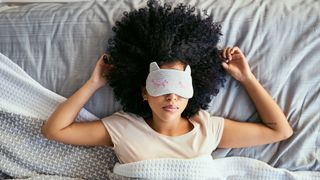3 intriguing new changes to your bedtime routine that can help you sleep better
Simple advice for breaking bad sleep habits

A lot of advice around how to sleep better is tried-and-tested tips most of us have heard before. Which is why I was so excited to come away from a recent event with some new techniques to try out – and they're all super simple to integrate into your existing bedtime routine.
The event was The The Sleep Charity's Sleep Conference, and while there was plenty to learn about sleep, these three practical tips stood out. They're particularly good for those of us with good intentions but a tendency to fall into bad sleep habits. By providing a new ways to think about your bed routine, these tips encourage you to stop, reassess, and change for the better.
To make the most of these bedtime tips, make sure you have a sleep setup that works for you. Our best mattress and best pillow guides can help you find a supportive bed that you’ll happily retreat to at the end of every evening. Let's explore some easy ways to get you drifting off.
1. Brush your teeth earlier in the evening
Brushing our teeth is a such an ingrained part of the bedtime routine that we don’t really think about what it means. But the combination of bright bathroom lights and strong flavored toothpaste can be something of a sensory overload. The simple act of brushing your teeth before bed might send you rocketing back to alertness.

Instead of waiting until the last minute, try brushing your teeth after you’ve finished your evening meal. Your teeth will still feel the benefits, and you won't disrupt your pre-bed drowsiness. And, as a side benefit, your fresh, clean mouth might discourage you from any late night nibbles and drinks, which can also act as a wake-up call (with the 10-3-2-1-0 sleep method, you stop eating and drinking alcohol three hours before bed).
And it doesn't have to be teeth brushing you move earlier in the evening. Washing your face, changing into your pajamas, setting your alarm – there are plenty of pre-bed activities that can be disruptive and are just as effective early in the evening.
2. Use music as a procrastination timer
'Just one more minute,’ is the refrain I repeat as I scroll through my phone before bed. In my head, I’m setting boundaries and encouraging myself to put down the sleep-destroying blue light machine. In reality, I'm lying to myself. Do I put my phone down after that minute? Nope, I scroll for another 10 and end up more awake than when I started.
Get daily insight, inspiration and deals in your inbox
Sign up for breaking news, reviews, opinion, top tech deals, and more.

Rather than these imaginary restrictions, try taking a practical timed approach. Not a sudden alarm startling you into dropping the phone, but something more gentle – a music timer.
The idea is simple: start playing a song or a piece of music, and give yourself until the end of the track to finish what you're doing. It acts as a less stressful countdown, giving you an opportunity to wrap up your evening and start your bedtime routine. Pick a familiar piece of music, and you'll recognize cues for how much time you have left so you can act accordingly.
3. Save low-key activities for your evening routine
With your devices away for the evening, it's too easy to fall into that 'what now?' trap that often leads us to picking our phones up again. To help you resist the temptation of another quick scroll through social media, it's good to have a low-key and relaxing activity to turn to. But how do you convince yourself to switch doomscrolling for reading, painting, meditating etc. when your phone is just so enticing?

By making these activities seem special, that's how. Put your favorite calming hobbies to the side during the day, only to be used in the evening. Giving yourself a limited window to actually engage with your interests can make them seem even more interesting. In turn, that phone you spent all day on will seem like less of a draw.

Ruth is TechRadar’s Sleep Writer. She’s here to help you find the perfect sleep setup for your budget and personal preferences. As well as keeping a keen eye on everything that’s going on in the world of mattresses, she regularly speaks to experts to help you learn how to improve your sleep habits, whether that’s by debunking sleep myths or explaining the science behind it all. Prior to joining the TechRadar team, she wrote features and product guides for new parents hoping to get a decent night's sleep, as well as writing for a variety of online spaces.